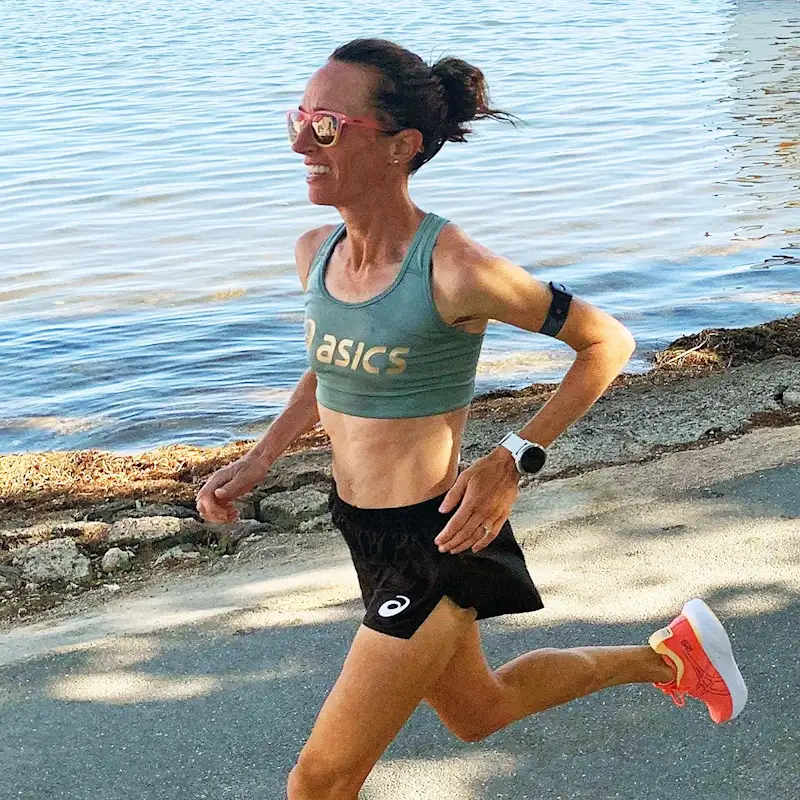
Lisa Weightman
Marathon World Championships
Lisa's headline numbers
Lisa's strategy
Fueling
Carbohydrate is the main fuel you burn when racing. Failing to fuel properly is a leading cause of underperformance in longer races.
Since working with the PF&H team, Lisa has focused on increasing her carb intake by incorporating gut training into her weekly training sessions. This allowed Lisa to consume ~150g of carb over the marathon, averaging 60g per hour which was achieved by starting her fueling strategy ~18 minutes into the race. By using the pro aid stations and alternating every 5km / 3.1 miles between a diluted ~170ml of PF Carb & Electrolyte Drink Mix and a PF 30 Gel, Lisa was able to maintain her exact pace over the back half of the race and finish in a very strong 16th position.
Hydration
Taking on board an appropriate amount of fluid and sodium is essential to maintaining blood volume and supporting the cardiovascular effort needed to perform on race day.
Whilst the absolute amount of sodium and fluid consumed per hour is important, it’s critical to consider these in relation to each other. This is known as 'relative sodium concentration' and it’s expressed in milligrams per litre (mg/L). How much sodium you’re taking in per litre of fluid is more important than the absolute amount taken in per hour.
Sweat sodium concentration (mg/L) is largely genetically determined and remains relatively stable. Knowing how salty your sweat is enables you to replace a good proportion of your sweat losses, which can range from 200-2,000mg/L.
Whilst Lisa’s losses are on the low side, getting her hydration strategy right is still crucial when it’s hot and/or humid as her higher sweat rate in these conditions can result in significant net losses over the duration of a race.
Learn moreWe know from her Sweat Test result that Lisa loses 614mg of sodium per litre (32oz) of sweat, so she sensibly used ~170ml of diluted, half strength PF Carb & Electrolyte Drink Mix to make sure the relative sodium concentration of her fluid intake matched her sweat sodium losses. This worked well and by reducing her pre-planned fluid volume on the fly, Lisa felt she drank enough to match her sweat losses in the 27℃ (80.6℉) conditions. This enabled her to rate her hydration strategy a perfect 10 (out of 10). Looking ahead to future races, Lisa may opt to use PF 30 Gels primarily over using drink mix based on feeling the gels worked better during the race. Alongside the gels, Lisa may consider using plain water to maintain hydration.
Caffeine
Beyond the Three Levers of Performance (carb, sodium and fluid), caffeine is one of only a few substances that is proven to improve performance for most endurance athletes as it can help stave off mental and physical fatigue.
Lisa accompanied her breakfast with a coffee which gave her a small caffeine boost going into the start of the race. During the race, Lisa took half a PF 30 Caffeine Gel to top up her caffeine levels to help pyschologically during the final section of the race. Moving forwards, Lisa may wish to take a larger caffeine dose within the last 30 minutes before the race to peak her blood caffeine levels as the race starts. Due to caffeine’s ~4-5-hour half-life, having a larger dose pre race and finishing her mid race caffeine gel will maintain a higher elevated level in her system throughout the race.
How Lisa hit her numbers
Here's everything that Lisa ate and drank on the day...
Lisa's weapons of choice
Final thoughts
Lisa's full stats
Data Confidence?
There is an adequate level of accuracy in the data collected and the numbers reported. The athlete manages to recall what they ate and drank including most specifics (brands flavours quantities plausible estimations of volumes). However there are estimations made within the data which affect the overall confidence level in the data reported.